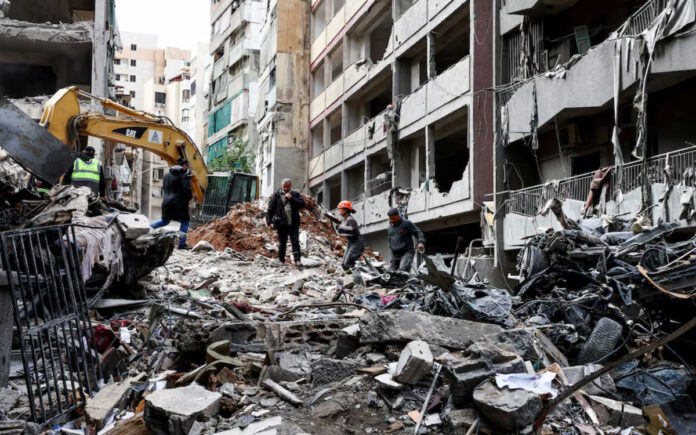Beirut: Stepping cautiously through the charred ruins of her neighborhood in central Beirut, Lebanese seamstress Laila Amayrad watched as bulldozers sifted through the rubble of what was once an eight-story residential building. Flattened by a massive Israeli airstrike, the scene represented the deadliest assault on the Lebanese capital in over a year.
The strike on the densely populated Basta Fawqa neighborhood occurred just before dawn on Saturday, killing at least 29 people, including children. Two days later, civil defense workers continued their painstaking search for survivors or remains amid the debris.
Amayrad, her red headscarf a stark contrast to the dust-covered ruins around her, recounted the horror of losing nine friends, neighbors, and clients in the attack. Many of the victims were hosting relatives who had fled southern Lebanon due to escalating Israeli shelling.
“They came here to be safe, because this neighborhood is safe. I would walk around alone at midnight because there are no weapons, no fighters, nothing here,” she told Reuters, her voice trembling. “And they were killed just sleeping at home, with no warning. It’s the innocents who are losing their lives in this.”
No Evacuation Warnings
Israeli authorities have yet to comment on the strike. While Israel claims its operations target Hezbollah and that warnings are issued to minimize civilian casualties, no evacuation notice preceded the Basta Fawqa bombardment.
Amayrad wryly noted the irony of feeling safer in Beirut’s southern suburbs—long considered a Hezbollah stronghold—where warnings are often issued before strikes. “At least Israel issues warnings there,” she remarked.
A Lebanese security source revealed that the Nov. 23 attack likely involved a bunker-busting bomb. However, residents, including Amayrad and Sherif Itani, another long-time local, insisted that the destroyed building had no bunker.
This strike follows a pattern of escalating violence in central Beirut. On Oct. 10, a nearby multi-story home was targeted without warning, resulting in the deaths of 22 people.
Also Read | Major Setback for Russia as Ukraine Targets S-400 System
Grim Recovery Efforts
By Monday afternoon, rescue workers continued their efforts, though hope of finding survivors had all but faded. A rescue worker, taking a brief respite, remarked that the devastation was unparalleled in over a year of Israeli airstrikes on Lebanon.
The Lebanese health ministry reported over 3,750 fatalities from Israeli strikes in the past year, marking a sharp escalation in hostilities since September.
At the site, Hassan Yassin, head of the rescue unit, described the gruesome reality of their work. “We picked up a leg here, a hand there. We took out the bodies of three children yesterday. We found a dead older couple, both of them in wheelchairs,” said Jaafar, an 18-year-old rescuer. “It was the worst scene yet.”
The Basta Fawqa attack leaves a grim reminder of the mounting civilian toll as the conflict deepens, shattering lives in its wake.



